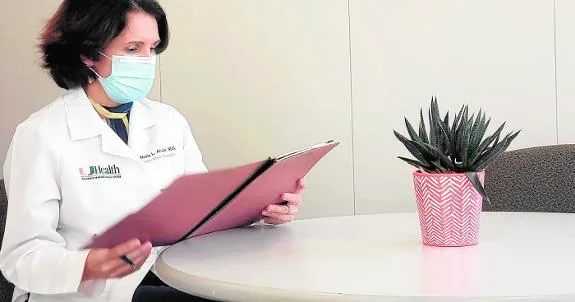The fight against Covid has its roots in Antequera
María Luisa Alcaide, research director at the Faculty of Medicine in Miami, hopes the vaccine will prevent future waves of the coronavirus
ANTONIO J. GUERRERO
Viernes, 20 de noviembre 2020, 17:16
Research for the Moderna vaccine in the USA has its roots in Antequera, in the form of María Luisa Alcaide Alonso, director of research at the Faculty of Medicine of Miami, which is developing the product which has been shown to be effective in 95 per cent of cases. She is the daughter of another researcher, Antonio Alcaide, who developed iboprofen, and whose children are continuing to contribute to the world of science. As he has worked all over the world they were born in different countries, but still feel that Antequera is their home. María Luisa certainly does: she was born in Philadelphia, but was christened in the San Miguel church in Antequera.
She has been working on the Moderna vaccine for several months. "The company is supported by the National Institutes of Health. A network of centres are taking part in the clinical tests, and the University of Miami is one of them. We are carrying out the phase three clinical study here," she says. "What we're doing is recruiting participants for a clinical test. Half of them are given the vaccine and the others receive a placebo". There are 30,000 volunteers all over the country and María Luisa is leading this project, which involves testing healthy people. "The phase three clinical test is designed to monitor how many people become infected in the long term," she says.
A few days ago it was announced that this vaccine is effective in up to 95 per cent of cases: "There have been very few infections among the volunteers who were given the vaccine, and many more in those who received the placebo," she says. Even so, there will be no definitive result until at least the end of this year because two doses of this vaccine are required, with an interval of 28 days between them.
As Dr Alcaide explains, "if the results of the phase three tests are good, we can apply for authorisation to produce and distribute the vaccine. Just a few months ago nobody was even talking about a vaccine, and yet we were able to test the first volunteers a couple of months ago". She believes the Moderna vaccine will be available early in 2021. "The efforts made by the scientific community, the research centres of course, and the volunteers are tremendous. Everything is progressing at a speed we have never known before."
With regard to possible side effects, she says that "studies in phases one and two have not shown toxicity. In the long term we will have to see, but in the short term we are not seeing much toxicity or many side effects".
When asked what makes the Moderna vaccine different to others, she says it is based on a mechanism called MRMA, a small genetic material which, when in contact with the immune cells, develops antibodies to protect when there is infection. After the tests in phases one and two, it appears to be effective in small groups and seems to be safe, which is important. The phase three test is the one that will show whether it really is going to prevent infections.
Although this research is taking place in the USA, international cooperation has been very important. "We think there will be more than one effective vaccine eventually and that is good news because it means more will be available," she says.
